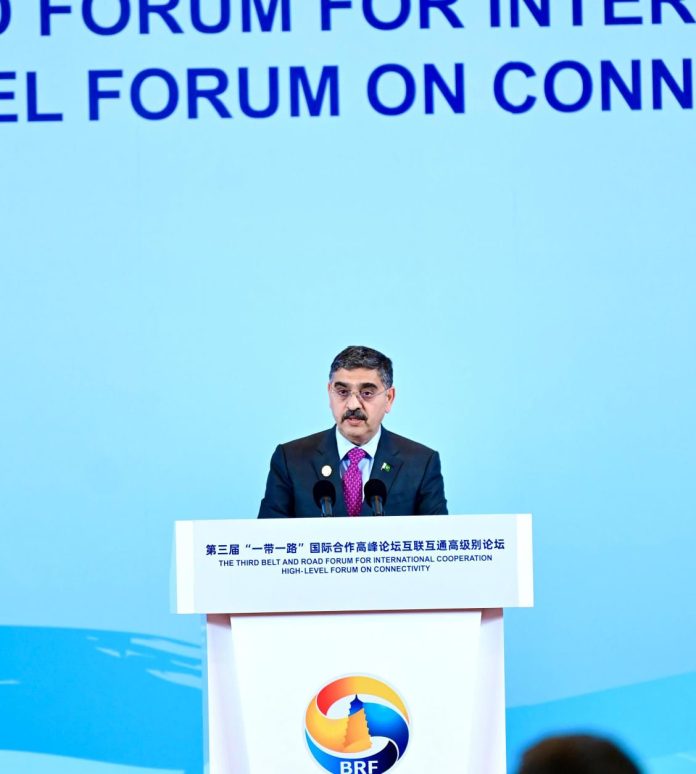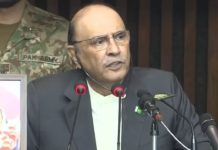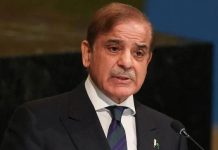BEIJING, Oct 18 (DNA):Caretaker Prime Minister Anwaar-ul-Haq Kakar on Wednesday said Pakistan was committed to working with China and other regional partners in achieving the ideals of an open global economy and promoting connectivity on a trans-continental scale.“With shared responsibility and by embracing the vision of working together, we can create a brighter, peaceful, and sustainable future for ourselves and for our generations,” he said in his address at the high-level event of the Third Belt and Road Forum (BRF) on ‘Connectivity in an Open Global Economy’.
The two-day forum, which marked the 10 years of the multi-billion dollar cross-regional Belt and Road Initiative, kicked off in China’s capital Beijing with representatives from 140 countries in attendance.
PM Kakar said Pakistan endorsed China’s vision of global connectivity and also looked forward to joining hands with other partners across borders and regions to materialize the projects.
“I am hopeful that together we can shape a world with the bonds that unite us together, rather than the forces that divide us,” he said.
The prime minister congratulated President Xi Jinping for his revolutionary idea of the Belt and Road Initiative launched 10 years ago that proved instrumental in bringing common development and shared prosperity.
He termed enhanced connectivity a profound factor in development and progress in the modern age of globalization.
“The BRI’s concept of shared future for mankind is not about road and railway infrastructure, but also to create linkages among civilizations and nations,” he said.
He mentioned that the world faced a number of challenges including post-pandemic effects, the divide between the developed and the impoverished, peace, and food security.
Kakar highlighted that BRI’s flagship project China-Pakistan Economic Corridor (CPEC) played a crucial role in generating new economic opportunities in Pakistan.
Underscoring its salience for Pakistan’s robust economic development, he endorsed the Chinese proposal for developing CPEC as a corridor of growth, innovation, livelihood, green economy, openness, and inclusiveness.
The prime minister underlined the need for a united global response to address complex transnational challenges faced by humankind and to prevent backsliding on the gains achieved under the UN Sustainable Development Goals and 2030 Agenda.
He emphasised the urgency of addressing infrastructure gaps in the developing world by investing in transportation, energy, and digital economy.
In Pakistan, he said CPEC’s 50 projects worth $25 billion investment resulted in the creation of modern highways, seaports, airports, and rapid mass transit systems.
He said the government of Pakistan had taken steps to make the country a trade hub by connecting Gwadar with the landlocked countries, thus opening new vistas to the west and beyond.
Kakar expressed confidence that as CPEC crossed its decade of launch, the next phase would be poised to accommodate rural farmers, students, and small tradesmen and ensure improvement in living standards, poverty alleviation, and jobs creation.
He said Pakistan’s collaboration with China in the information technology sector and CPEC’s green corridor would ensure modernization, food security, and agricultural and environmental protection.
“This vision promotes cooperation, collective security, inclusive and sustainable development, and a balanced eco-system as the only way to address global challenges,” he said.
The BRF was opened by Chinese President Xi Jinping this morning where he highlighted the concept of working with all participants to draw a new blueprint for high-quality Belt and Road cooperation.
Xi said China looks forward to strengthening ties, engaging in dialogues, forging new partnerships, and promoting regional connectivity for a brighter future.
“The BRF is about planning together, building together, and benefiting together,” he said, adding that the project had established a new framework for international cooperation.

















